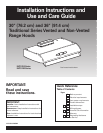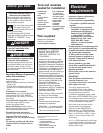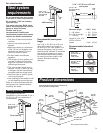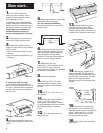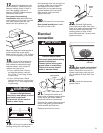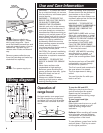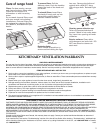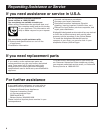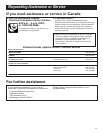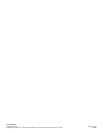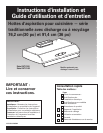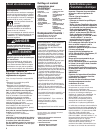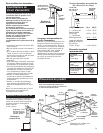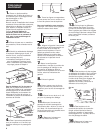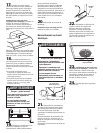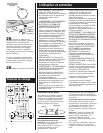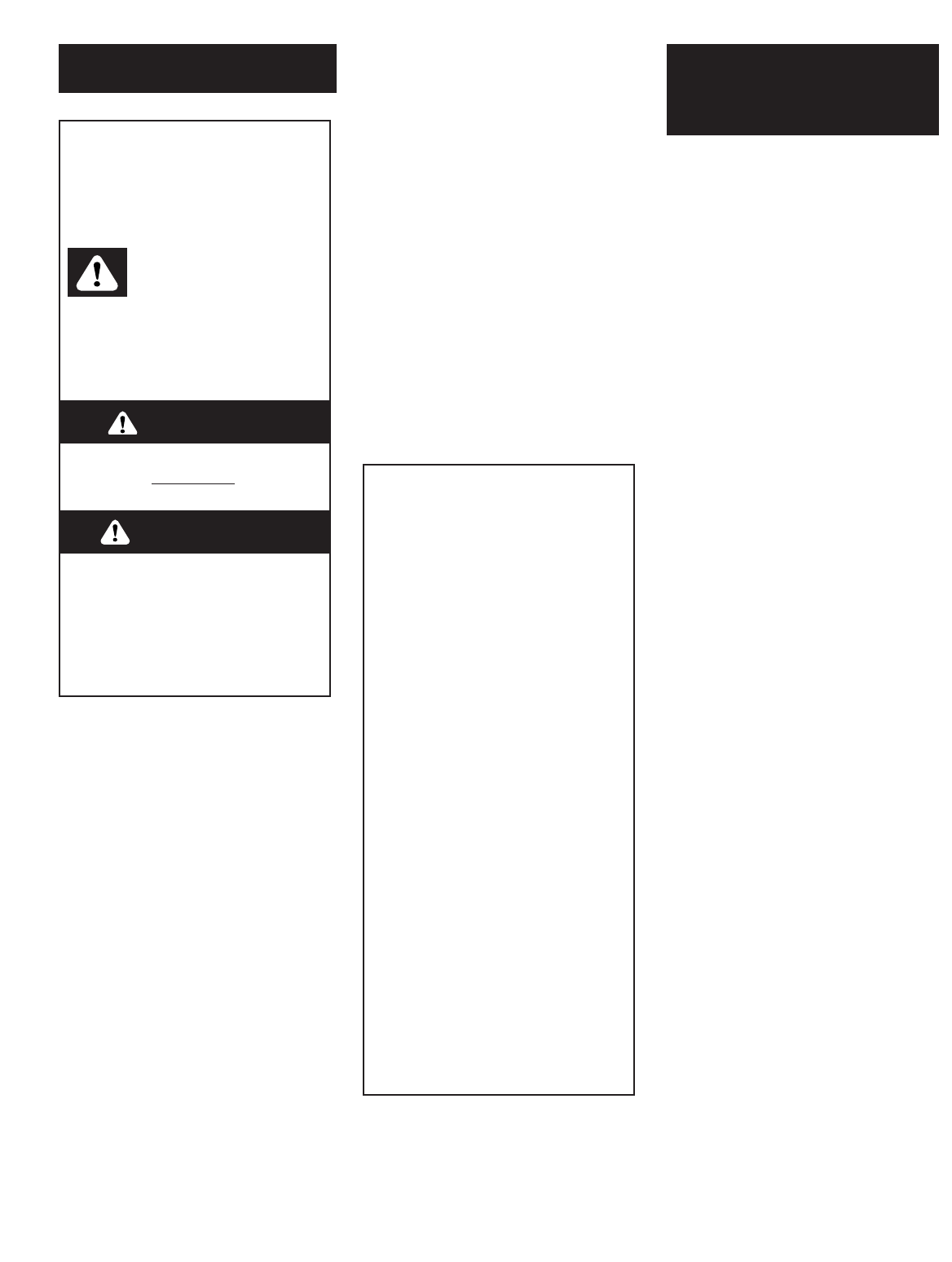
2
Electrical
requirements
Before you start...
Proper installation is your
responsibility:
• Have a qualified technician install this
range hood.
• Comply with installation clearances
specified on the model/serial rating
plate.
If installation is non-vented
(recirculating), you must use Non-Vent
(recirculating) Kit Part No. 4396273,
available from your dealer. The kit fits
all models.
The model/serial rating plate is located
inside the range hood. To access,
remove the grease filters.
Range hood location should be away
from strong draft areas, such as windows,
doors and strong heating vents.
Grounded electrical connection is
required. See “Electrical requirements.”
Important:This hood must be a
minimum of 24" (61 cm) above cooking
surface.
All openings in ceiling and wall where
range hood will be installed must be
sealed.
Important: Observe all governing
codes and ordinances.
This is the safety alert symbol.
This symbol alerts you to
potential hazards that can kill
or hurt you and others.
All safety messages will follow the
safety alert symbol and either the word
“DANGER” or “WARNING”. These
words mean:
You can be killed or seriously injured
if you don’t follow instructions.
DANGER
WARNING
Your safety and the safety of
others are very important.
We have provided many important
safety messages in this manual and
on your appliance. Always read and
obey all safety messages.
All safety messages will tell you what
the potential hazard is, tell you how to
reduce the chance of injury, and tell
you what can happen if the instructions
are not followed.
You can be killed or seriously injured
if you don’t immediately
follow
instructions.
WARNING — TO REDUCE THE
RISK OF FIRE, ELECTRIC
SHOCK, OR INJURY TO
PERSONS, OBSERVE THE
FOLLOWING:
Installation work and electrical
wiring must be done by qualified
person(s) in accordance with all
applicable Codes and Standards,
including fire related construction.
Sufficient air is needed for proper
combustion and exhausting of
gases through the flue (chimney)
of fuel burning equipment to
prevent back drafting. Follow the
heating equipment manufacturer’s
guideline and safety standards
such as those published by the
National Fire Protection
Association (NFPA), and the
American Society of Heating
Refrigeration and Air Conditioning
Engineers (ASHRAE), and the
local code authorities.
When cutting or drilling into wall
or ceiling, do not damage
electrical wiring and other hidden
utilities.
Ducted fans must always be
vented to the outdoors.
WARNING — To reduce the risk
of fire, use only metal ductwork.
This unit must be grounded.
Tools and materials
needed for installation:
• Phillips head
screwdriver
• drill
• 1-1/2" (4.0 cm)
drill bit
• keyhole saw
• sabre or jig saw
• metal snips
• tape (for template)
• duct tape
• pencil
• UL- or CSA-listed
1/2" (12.5 mm)
conduit connector
(for range hood)
• 1 wall or roof cap
• power supply
cable (if not
previously
installed)
• metal vent system
(if not previously
installed)
Parts supplied:
• four 2-3/4" (7 cm) screws
• four 2" (5.1 cm) screws
• hood installation template
The range hood must be connected
with copper wire only.
The range hood should be
connected directly to the fused
disconnect (or circuit breaker) box
through flexible armored or
nonmetallic sheathed copper cable.
Wire sizes (COPPER WIRE ONLY) and
connections must conform with the
rating of the appliance as specified
on the model/serial rating plate.
Wire sizes must conform to the
requirements of the National
Electrical Code ANSI/NFPA 70 —
latest edition*, or CSA Standards
C22.1-94, Canadian Electrical Code
Part 1 and C22.2 No. 0-M91 - latest
edition** and all local codes and
ordinances.
A U.L.- or CSA-listed strain relief must
be provided at each end of the power
supply cable (at the range hood and
at the junction box).
Important: Observe all governing
codes and ordinances.
It is the customer’s responsibility:
• To contact a qualified electrical
installer.
• To assure that the electrical
installation is adequate and in
conformance with National
Electrical Code, ANSI/NFPA 70
— latest edition*, or CSA
Standards C22.1-94, Canadian
Electrical Code, Part 1 and
C22.2 No.0-M91 - latest
edition** and all local codes
and ordinances.
If codes permit and a separate ground
wire is used, it is recommended that
a qualified electrician determine that
the ground path is adequate.
A 120-volt, 60-Hz, AC-only, fused
electrical system is required on a
separate 15-amp circuit, fused on
both sides of the line.
Do not ground to a gas pipe.
Check with a qualified electrician if
you are not sure range hood is
properly grounded.
Do not have a fuse in the neutral or
ground circuit.
IMPORTANT:
Save Installation Instructions for
electrical inspector’s use.
Copies of the standards listed may be
obtained from:
* National Fire Protection Association
One Batterymarch Park
Quincy, Massachusetts 02269
** CSA International
8501 East Pleasant Valley Road
Cleveland, Ohio 44131-5575



